Here are my favorite poems about loyalty categorized:
- Short poems about loyalty
- Poems about loyalty in relationships
- Poems about loyalty and betrayal
- Poems about loyalty that rhyme
- Poems about loyalty and friendship
So if you want the best poems about loyalty, then you’re in the right place.
Let’s get into it!
- 67 Stirring Poems About Hard Workers
- 67 Joyful Poems About Contentment
- 105 Enduring Poems About Patience
- 143 Encouraging Poems About Waiting
- 27 Uplifting Poems About Perseverance

Devoted Poems About Loyalty
Delve into a curated selection of profoundly evocative poems about loyalty, thoughtfully categorized for your immersive exploration.
Our collection showcases works that delve into the intricacies of loyalty, exploring its depth, unwavering commitment, and the profound connections it forges.
With our handpicked assortment, you can discover the finest poems about loyalty, all gathered conveniently in one place.
Take a moment to immerse yourself in the poignant verses that illuminate the bonds, devotion, and unwavering dedication that define this noble virtue, inviting reflection on the power of loyalty to shape our lives and relationships.
Let’s dive into it!
My #1 Favorite Poem About Loyalty

“The Loyalists” by Sarah Anne Curzon
Ye, who with your blood and sweat
Watered the furrows of this land,—
See where upon a nation’s brow,
In honour’s front, ye proudly stand!
Who for her pride abased your own,
And gladly on her altar laid
All bounty of the older world,
All memories that your glory made,
And to her service bowed your strength,
Took labour for your shield and crest;
See where upon a nation’s brow,
Her diadem, ye proudly rest!
Short Poems About Loyalty

“Loyalty” by Emily Dickinson
Split the lark and you’ll find the music,
Bulb after bulb, in silver rolled,
Scantily dealt to the summer morning,
Saved for your ear when lutes be old.
Loose the flood, you shall find it patent,
Gush after gush, reserved for you;
Scarlet experiment! sceptic Thomas,
Now, do you doubt that your bird was true?
“Alter? When the hills do.” by Emily Dickinson
Alter? When the hills do.
Falter? When the sun
Question if his glory
Be the perfect one.
Surfeit? When the daffodil
Doth of the dew:
Even as herself, O friend!
I will of you!
“Don Quixote” by Austin Dobson
Behind thy pasteboard, on thy battered hack,
Thy lean cheek striped with plaster to and fro,
Thy long spear levelled at the unseen foe,
And doubtful Sancho trudging at thy back,
Thou wert a figure strange enough, good lack!
To make Wiseacredom, both high and low,
Rub purblind eyes, and (having watched thee go)
Dispatch its Dogberrys upon thy track:
Alas! poor Knight! Alas! poor soul possest?
Yet would to-day when Courtesy grows chill,
And life’s fine loyalties are turned to jest,
Some fire of thine might burn within us still!
Ah, would but one might lay his lance in rest,
And charge in earnest—were it but a mill!

“Calais, August, 1802.” by William Wordsworth
Is it a Reed that’s shaken by the wind,
Or what is it that ye go forth to see?
Lords, Lawyers, Statesmen, Squires of low degree,
Men known, and men unknown, Sick, Lame, and Blind,
Post forward all, like Creatures of one kind,
With first-fruit offerings crowd to bend the knee
In France, before the new-born Majesty.
‘Tis ever thus. Ye Men of prostrate mind!
A seemly reverence may be paid to power;
But that’s a loyal virtue, never sown
In haste, nor springing with a transient shower:
When truth, when sense, when liberty were flown
What hardship had it been to wait an hour?
Shame on you, feeble Heads, to slavery prone!
“A Petition” by Robert Ernest Vernède
All that a man might ask thou hast given me, England,
Birthright and happy childhood’s long heart’s-ease,
And love whose range is deep beyond all sounding
And wider than all seas:
A heart to front the world and find God in it.
Eyes blind enow but not too blind to see
The lovely things behind the dross and darkness,
And lovelier things to be;
And friends whose loyalty time nor death shall weaken
And quenchless hope and laughter’s golden store—
All that a man might ask thou hast given me, England,
Yet grant thou one thing more:
That now when envious foes would spoil thy splendour,
Unversed in arms, a dreamer such, as I,
May in thy ranks be deemed not all unworthy,
England, for thee to die.
“Work Loyally” by Edward Young
Just where you stand in the conflict,
There is your place!
Just where you think you are useless
Hide not your face!
God placed you there for a purpose,
Whate’er it be;
Think He has chosen you for it—
Work loyally.
Gird on your armor! Be faithful
At toil or rest,
Whiche’er it be, never doubting
God’s way is best.
Out in the fight, or on picket,
Stand firm and true;
This is the work which your Master
Gives you to do.
* * * * * * * *
Who does the best his circumstance allows,
Does well, acts nobly; angels could no more.
Poems About Loyalty in Relationships
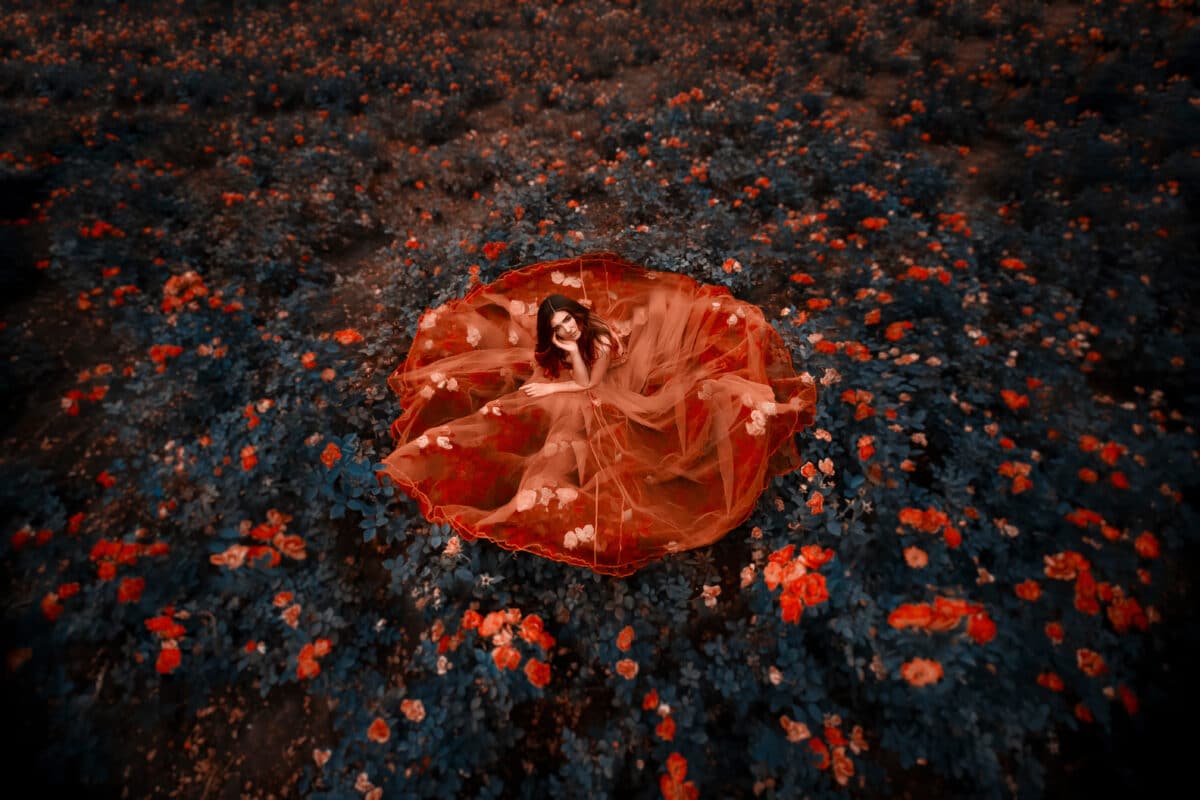
“How Do I Love Thee?” by Elizabeth Barrett Browning
How do I love thee? Let me count the ways.
I love thee to the depth and breadth and height
My soul can reach, when feeling out of sight
For the ends of being and ideal grace.
I love thee to the level of every day’s
Most quiet need, by sun and candle-light.
I love thee freely, as men strive for right.
I love thee purely, as they turn from praise.
I love thee with the passion put to use
In my old griefs, and with my childhood’s faith.
I love thee with a love I seemed to lose
With my lost saints. I love thee with the breath,
Smiles, tears, of all my life; and, if God choose,
I shall but love thee better after death.
“Faults” by Sara Teasdale
They came to tell your faults to me,
They named them over one by one;
I laughed aloud when they were done,
I knew them all so well before,
Oh, they were blind, too blind to see
Your faults had made me love you more.
“I Would Live In Your Love” by Sara Teasdale
I would live in your love as the sea-grasses live in the sea,
Borne up by each wave as it passes, drawn down by each wave that recedes;
I would empty my soul of the dreams that have gathered in me,
I would beat with your heart as it beats, I would follow your soul
as it leads.
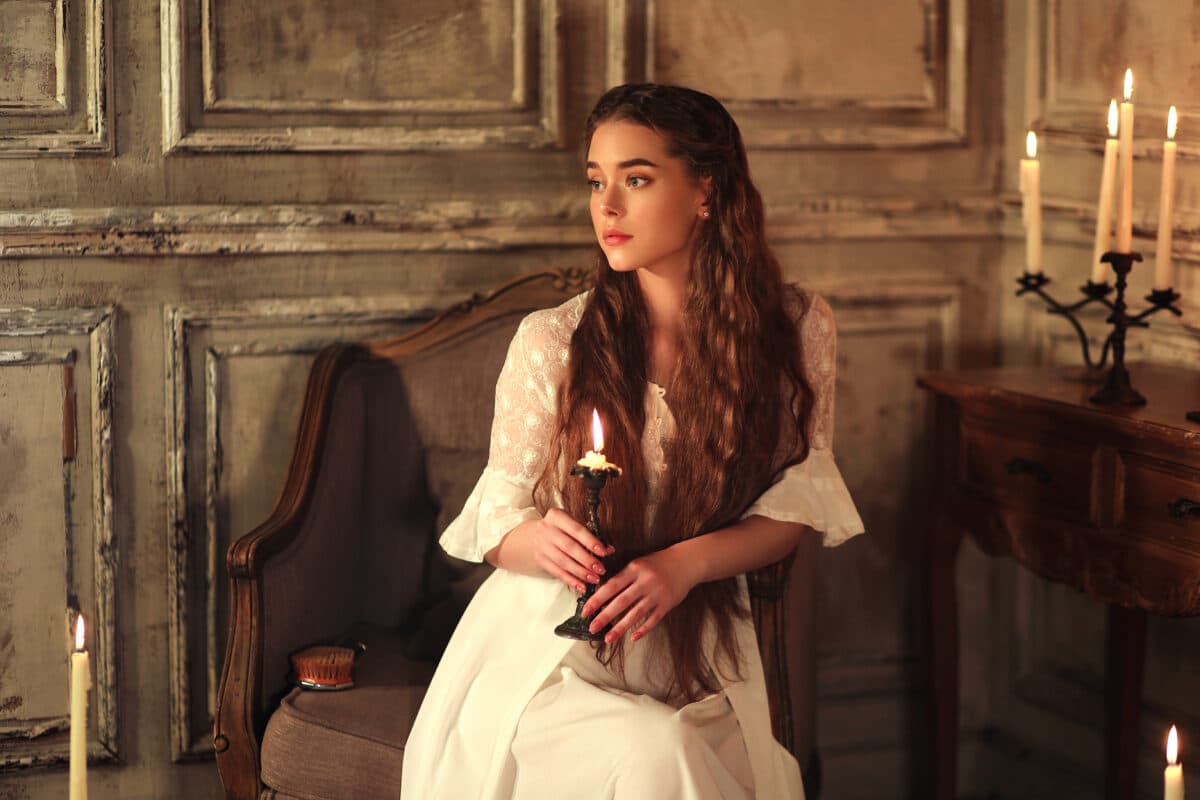
“Annabel Lee” by Edgar Allan Poe
It was many and many a year ago,
In a kingdom by the sea,
That a maiden there lived whom you may know
By the name of ANNABEL LEE;
And this maiden she lived with no other thought
Than to love and be loved by me.
I was a child and she was a child,
In this kingdom by the sea;
But we loved with a love that was more than love,
I and my Annabel Lee;
With a love that the winged seraphs of heaven
Coveted her and me.
And this was the reason that, long ago,
In this kingdom by the sea,
A wind blew out of a cloud, chilling
My beautiful Annabel Lee;
So that her highborn kinsman came
And bore her away from me,
To shut her up in a sepulchre
In this kingdom by the sea.
The angels, not half so happy in heaven,
Went envying her and me,
Yes!, that was the reason (as all men know,
In this kingdom by the sea)
That the wind came out of the cloud by night,
Chilling and killing my Annabel Lee.
But our love it was stronger by far than the love
Of those who were older than we,
Of many far wiser than we,
And neither the angels in heaven above,
Nor the demons down under the sea,
Can ever dissever my soul from the soul
Of the beautiful Annabel Lee.
For the moon never beams without bringing me dreams
Of the beautiful Annabel Lee;
And the stars never rise but I feel the bright eyes
Of the beautiful Annabel Lee;
And so, all the night-tide, I lie down by the side
Of my darling, my darling, my life and my bride,
In the sepulchre there by the sea,
In her tomb by the sounding sea.
“Out Over the Forth” by Robert Burns
I
Out over the Forth, I look to the North;
But what is the north and its Highlands to me?
The south nor the east gie ease to my breast,
The far foreign land, or the wide rolling sea.
II
But I look to the west when I gae to rest,
That happy my dreams and my slumbers may be;
For far in the west lives he I loe best,
The man that is dear to my babie and me.
“Still True To Nell.” by John Hartley
Th’ sun wor settin, – red an gold,
Wi splendor paintin th’ west,
An purplin tints throo th’ valley roll’d,
As daan he sank to rest.
Yet dayleet lingered looath to leeav
A world soa sweet an fair,
Wol silent burds a pathway cleave,
Throo th’ still an slumb’rin air.
Aw stroll’d along a country rooad,
Hedged in wi thorn an vine;
Which wild flower scents an shadows broad,
Converted to a shrine.
As twileet’s deeper curtains fell
Aw sat mi daan an sighed;
Mi thowts went back to th’ time when Nell,
Had rambled bi mi side.
Aw seemed to hear her voice agean,
Soft whisperin i’ mi ear,
Recallin things ‘at once had been,
When th’ futur all wor clear.
When love, – pure, honest, youthful love
Had left us nowt to crave;
An fancies full ov bliss we wove; –
Alas! Nell’s in her grave.
Oh, Nell! I’ that fair hooam ov thine,
Whear all is breet an pure, – –
Say, – is ther room for love like mine?
Can earthborn love endure?
Do angels’ hearts past vows renew,
To mortals here who dwell?
It must be soa; – if my heart’s true,
Aw cannot daat thee, Nell.
It’s weel we cannot see beyond
That curtain Deeath lets fall;
Lest cheerin hooaps, an longins fond,
Should be denied us all.
Better to live i’ hooap nor fear, –
‘Tis Mercy plan’d it soa;
For if my Nelly isn’t thear,
Aw shouldn’t care to goa.

“She, to Him. III” by Thomas Hardy
I will be faithful to thee; aye, I will!
And Death shall choose me with a wondering eye
That he did not discern and domicile
One his by right ever since that last Good-bye!
I have no care for friends, or kin, or prime
Of manhood who deal gently with me here;
Amid the happy people of my time
Who work their love’s fulfilment, I appear
Numb as a vane that cankers on its point,
True to the wind that kissed ere canker came;
Despised by souls of Now, who would disjoint
The mind from memory, and make Life all aim,
My old dexterities of hue quite gone,
And nothing left for Love to look upon.
“Ever Faithful to You” by Lucian B. Watkins
When e’er I read these words, Dear Heart, of your sweet valentine,
I’m sure no heart can ever feel a sweeter joy than mine.
“Faithful!” no word can e’er express a truer, greater love—
No truer constancy than this have angels up above!
“Ever!” ah, then eternally you pledge that you’ll be true!
For love’s sweet sake, alone, I choose a happy life with you.
Through every sorrow, joy or pain that we in life may meet,
In sweet companionship we’ll share—the bitter with the sweet.
We’ll live with these words of faithfulness, what e’er our lot may be.
And live that we may after death from earthly stains be free.
“Faith Everlasting” by Anonymous
Dear, if you change, I’ll never choose again;
Sweet, if you shrink, I’ll never think of love;
Fair, if you fail, I’ll judge all beauty vain;
Wise, if too weak, more wits I’ll never prove.
Dear, sweet, fair, wise! change, shrink, nor be not weak;
And, on my faith, my faith shall never break.
Earth with her flowers shall sooner heaven adorn;
Heaven her bright stars through earth’s dim globe shall move;
Fire heat shall lose, and frosts of flames be born;
Air, made to shine, as black as hell shall prove:
Earth, heaven, fire, air, the world transform’d shall view,
Ere I prove false to faith or strange to you.

“The Constant Lover” by Sir John Suckling
Out upon it, I have loved
Three whole days together!
And am like to love three more,
If it prove fair weather.
Time shall moult away his wings
Ere he shall discover
In the whole wide world again
Such a constant lover.
But the spite on ’t is, no praise
Is due at all to me:
Love with me had made no stays,
Had it any been but she.
Had it any been but she,
And that very face,
There had been at least ere this
A dozen dozen in her place.
“The Memory of the Heart” by Daniel Webster
If stores of dry and learnèd lore we gain,
We keep them in the memory of the brain;
Names, things, and facts,—whate’er we knowledge call,—
There is the common ledger for them all;
And images on this cold surface traced
Make slight impression, and are soon effaced.
But we ’ve a page, more glowing and more bright,
On which our friendship and our love to write;
That these may never from the soul depart,
We trust them to the memory of the heart.
There is no dimming, no effacement there;
Each new pulsation keeps the record clear;
Warm, golden letters all the tablet fill,
Nor lose their lustre till the heart stands still.
“O Faithful heart! on balmy nights like this” by Paul Hamilton Hayne
O faithful heart! on balmy nights like this,
I long to tell thee all the love I bear,—
My sacred love! that knows not doubt, or fear,
Fixéd in golden round of married bliss;
The rapture of our first betrothal kiss
Thrills through me now, as warmly fond and dear
As when with eager soul I bent to hear
Thou didst not deem my tremulous vows amiss.
TIME cannot chill a love so true as ours,
But rather, like a spiritual SUN, matures
Affection’s bloom, and brightens all its flowers;
Thus, that which charmed in youth our manhood lures,
For passion wins from age its noblest powers,
And love ’s evolved from love, whilst love endures.
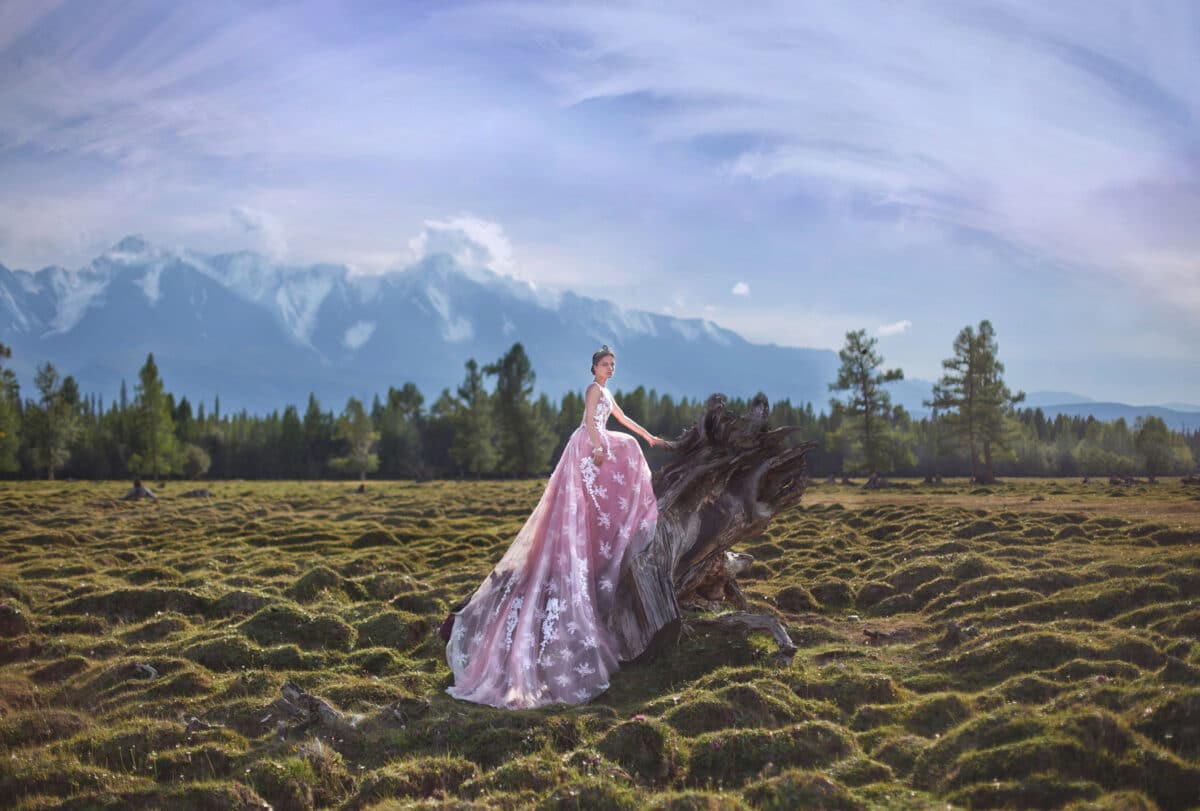
“The Faithful Bride” by Anonymous
There is a legend (and ’tis quaintly sweet),
Of man and maid, who loved, long, long, ago.
But fate was cruel,—they were forced to part,
And she was left alone in grief and woe.
And she was left alone in grief and woe,
Nor heeded she their taunts and scornful jeers;
But in the secret vigils of the night,
His letters read again with many tears.
Sweet promises, writ to her long ago—
They warmed her heart these words of living flame;
And much men marveled, for her trust proved true;
With pomp and glory back her lover came.
“My own,” he said, “Why didst thou trust in me,
When men but mocked,—and I away so long?”
“Dear heart,” she said, “I read thy loving words,
Read and believed, and so my love grew strong.”
Wouldst read the moral in my simple lines?
The bride is Israel, her Beloved, He
Who ruleth heaven and earth, the Lord our God;
And she who was so sad, shall happy be.
And He shall say, “O tender rose of mine,
Which I have taken back beyond recall,
What kept alive thy simple faith in Me?”
“Thy Law, O Lord, which was my joy, my all!”
“Thine am I, my faithful Fair” by Robert Burns
Thine am I, my faithful Fair,
Thine, my lovely Nancy;
Ev’ry pulse along my veins,
Ev’ry roving fancy.
To thy bosom lay my heart,
There to throb and languish;
Tho’ despair had wrung its core,
That would heal its anguish.
Take away those rosy lips,
Rich with balmy treasure;
Turn away thine eyes of love,
Lest I die with pleasure!
What is life when wanting Love?
Night without a morning:
Love’s the cloudless summer sun,
Nature gay adorning.
“The Husband’s Message” by Anonymous
First I shall freely confide to you
The tale of this tablet of wood. As a tree I grew up
On the coast of Mecealde, close by the sea.
Frequently thence to foreign lands
I set forth in travel, the salt streams tried
In the keel of the ship at a king’s behest.
Full oft on the bosom of a boat I have dwelt,
Fared over the foam a friend to see,
Wherever my master on a mission sent me,
Over the crest of the wave. I am come here to you
On the deck of a ship and in duty inquire
How now in your heart you hold and cherish
The love of my lord. Loyalty unwavering
I affirm without fear you will find in his heart.
The maker of this message commands me to bid thee,
O bracelet-adorned one, to bring to thy mind
And impress on thy heart the promises of love
That ye two in the old days often exchanged
While at home in your halls unharmed you might still
Live in the land, love one another,
Dwell in the same country. He was driven by feud
From the powerful people. He prays now, most earnestly
That you learn with delight you may launch on the sea-stream
When from the height of the hill you hear from afar
The melancholy call of the cuckoo in the wood.
Let not thereafter any living man
Prevent thy voyage or prevail against it.
Seek now the shore, the sea-mew’s home!
Embark on the boat that bears thee south,
Where far over the foam thou shalt find thy lord,—
Where lingers thy lover in longing and hope.
In the width of the world not a wish or desire
More strongly stirs him (he instructs me to say)
Than that gracious God should grant you to live
Ever after at ease together,
To distribute treasures to retainers and friends,
To give rings of gold. Of gilded cups
And of proud possessions a plenty he has,
And holds his home far hence with strangers,
His fertile fields, where follow him many
High-spirited heroes— though here my liege-lord,
Forced by the fates, took flight on a ship
And on the watery waves went forth alone
To fare on the flood-way: fain would he escape,
Stir up the sea-streams. By strife thy lord hath
Won the fight against woe. No wish will he have
For horses or jewels or the joys of mead-drinking,
Nor any earl’s treasures on earth to be found,
O gentle lord’s daughter, if he have joy in thee,
As by solemn vows ye have sworn to each other.
I set as a sign S and R together,
E, A, W, and D, as an oath to assure you
That he stays for thee still and stands by his troth;
And as long as he lives it shall last unbroken,—
Which often of old with oaths ye have plighted.
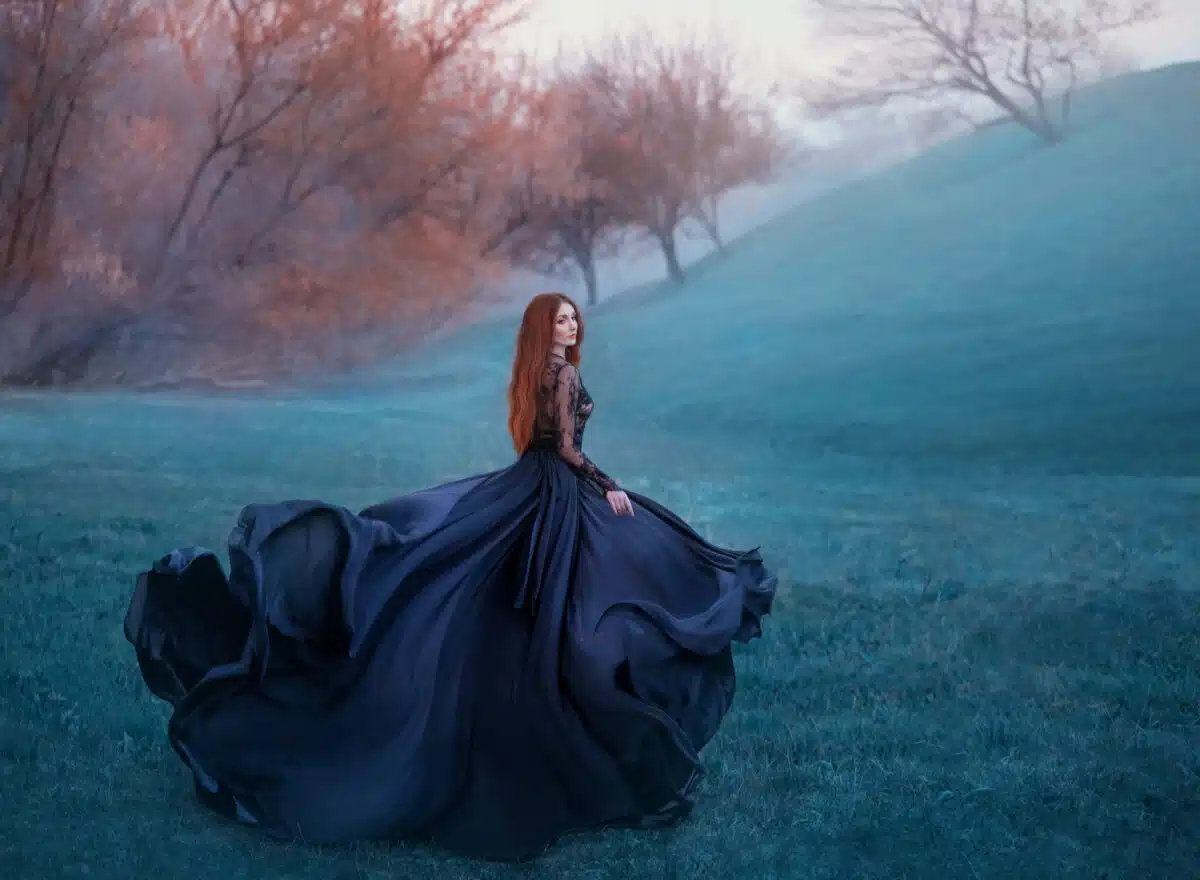
“An Elegy” by Ben Johnson
Though beauty be the mark of praise,
And yours, of whom I sing, be such
As not the world can praise too much,
Yet is ’t your virtue now I raise.
A virtue, like allay, so gone
Throughout your form, as though that move,
And draw, and conquer all men’s love,
This subjects you to love of one,
Wherein you triumph yet: because
’Tis of yourself, and that you use
The noblest freedom, not to choose
Against or faith, or honour’s laws.
But who could less expect from you,
In whom alone Love lives again?
By whom he is restored to men;
And kept, and bred, and brought up true?
His falling temples you have reared,
The withered garlands ta’en away;
His altars kept from the decay
That envy wished, and nature feared;
And on them burns so chaste a flame,
With so much loyalty’s expense,
As Love, t’ acquit such excellence,
Is gone himself into your name.
And you are he: the deity
To whom all lovers are designed,
That would their better objects find;
Among which faithful troop am I;
Who, as an offering at your shrine,
Have sung this hymn, and here entreat
One spark of your diviner heat
To light upon a love of mine;
Which, if it kindle not, but scant
Appear, and that to shortest view,
Yet give me leave t’ adore in you
What I, in her, am grieved to want.
“Womanhood” by Ella Wheeler Wilcox
She must be honest, both in thought and deed,
Of generous impulse, and above all greed;
Not seeking praise, or place, or power, or pelf,
But life’s best blessings for her higher self,
Which means the best for all.
She must have faith,
To make good friends of Trouble, Pain, and Death,
And understand their message.
She should be
As redolent with tender sympathy
As is a rose with fragrance.
Cheerfulness
Should be her mantle, even though her dress
May be of Sorrow’s weaving.
On her face
A loyal nature leaves its seal of grace,
And chastity is in her atmosphere.
Not that chill chastity which seems austere
(Like untrod snow-peaks, lovely to behold
Till once attained—then barren, loveless, cold);
But the white flame that feeds upon the soul
And lights the pathway to a peaceful goal.
A sense of humour, and a touch of mirth,
To brighten up the shadowy spots of earth;
And pride that passes evil—choosing good.
All these unite in perfect womanhood.
“An “If” For Girls” by Elizabeth Lincoln Otis
If you can dress to make yourself attractive,
Yet not make puffs and curls your chief delight;
If you can swim and row, be strong and active,
But of the gentler graces lose not sight;
If you can dance without a craze for dancing,
Play without giving play too strong a hold,
Enjoy the love of friends without romancing,
Care for the weak, the friendless and the old;
If you can master French and Greek and Latin,
And not acquire, as well, a priggish mien,
If you can feel the touch of silk and satin
Without despising calico and jean;
If you can ply a saw and use a hammer,
Can do a man’s work when the need occurs,
Can sing when asked, without excuse or stammer,
Can rise above unfriendly snubs and slurs;
If you can make good bread as well as fudges,
Can sew with skill and have an eye for dust,
If you can be a friend and hold no grudges,
A girl whom all will love because they must;
If sometime you should meet and love another
And make a home with faith and peace enshrined,
And you its soul—a loyal wife and mother—
You’ll work out pretty nearly to my mind
The plan that’s been developed through the ages,
And win the best that life can have in store,
You’ll be, my girl, the model for the sages—
A woman whom the world will bow before.
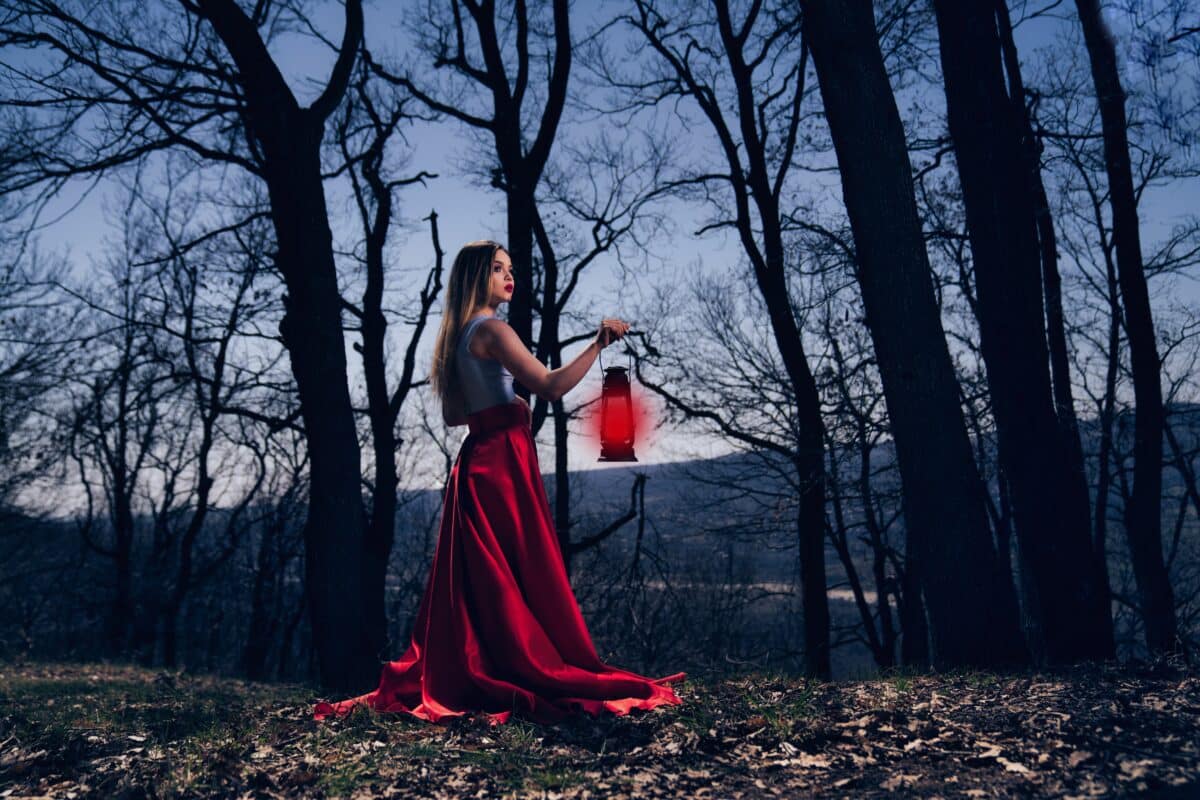
“Rappelle-Toi” by Henry Van Dyke
Remember, when the timid light
Through the enchanted hall of dawn is gleaming;
Remember, when the pensive night
Beneath her silver-sprinkled veil walks dreaming;
When pleasure calls thee and thy heart beats high,
When tender joys through evening shades draw nigh,
Hark, from the woodland deeps
A gentle whisper creeps,
Remember!
Remember, when the hand of fate
My life from thine forevermore has parted;
When sorrow, exile, and the weight
Of lonely years have made me heavy-hearted;
Think of my loyal love, my last adieu;
Absence and time are naught, if we are true;
Long as my heart shall beat,
To thine it will repeat,
Remember!
Remember, when the cool, dark tomb
Receives my heart into its quiet keeping,
And some sweet flower begins to bloom
Above the grassy mound where I am sleeping;
Ah then, my face thou nevermore shalt see,
But still my soul will linger close to thee,
And in the holy place of night,
The litany of love recite,—
Remember!
“Love and Death” by Giacomo Leopardi
Children of Fate, in the same breath
Created were they, Love and Death.
Such fair creations ne’er were seen,
Or here below, or in the heaven serene.
The first, the source of happiness,
The fount whence flows the greatest bliss
That in the sea of being e’er is found;
The last each sorrow gently lulls,
Each harsh decree of Fate annuls.
Fair child with beauty crowned,
Sweet to behold, not such
As cowards paint her in their fright,
She in young Love’s companionship
Doth often take delight,
As they o’er mortal paths together fly,
Chief comforters of every loyal heart.
Nor ever is the heart more wise
Than when Love smites it, nor defies
More scornfully life’s misery,
And for no other lord
Will it all dangers face so readily.
When thou thy aid dost lend,
O Love, is courage born, or it revives;
And wise in deeds the race of man becomes,
And not, as it is prone,
In fruitless thought alone.
And when first in our being’s depth
This passion deep is born,
Though happy, we are still forlorn;
A languor strange doth o’er us steal;
A strange desire of death we feel.
I know not why, but such we ever prove
The first effect of true and potent love.
It may be, that this wilderness
Then first appals our sight;
And earth henceforth to us a dreary waste
Appears, without that new, supreme delight,
That in our thought is fondly traced;
And yet our hearts, foreboding, feel the storm
Within, that it may cause, the misery.
We long for rest, we long to flee,
Hoping some friendly haven may be found
Of refuge from the fierce desire,
That raging, roaring, darkens all around.
And when this formidable power
Hath his whole soul possessed,
And raging care will give his heart no rest,
How many times implored
With most intense desire,
Art thou, O Death, by the poor wretch, forlorn!
How oft at eve, how oft at dawn,
His weary frame upon the couch he throws,
Too happy, if he never rose,
In hopeless conflict with his pain,
Nor e’er beheld the bitter light again!
And oft, at sound of funeral bell,
And solemn chant, that guides
Departed souls unto eternal rest,
With sighs most ardent from his inmost breast,
How hath he envied him,
Who with the dead has gone to dwell!
The very humblest of his kind,
The simple, rustic hind, who knows
No charm that knowledge gives;
The lowliest country lass that lives,
Who, at the very thought of death,
Doth feel her hair in horror rise,
Will calmly face its agonies,
Upon the terrors of the tomb will gaze
With fixed, undaunted look,
Will o’er the steel and poison brood,
In meditative mood,
And in her narrow mind,
The kindly charm of dying comprehend:
So much the discipline of Love
Hath unto Death all hearts inclined!
Full often when this inward woe
Such pass has reached as mortal strength
No longer can endure,
The feeble body yields at length,
To its fierce blows, and timely, then,
Benignant Death her friendly power doth show:
Or else Love drives her hapless victims so,
Alike the simple clown,
And tender country lass,
That on themselves their desperate hands they lay,
And so are borne unto the shades below.
The world but laughs at their distress,
Whom heaven with peace and length of days doth bless.
To fervid, happy, restless souls
May fate the one or other still concede,
Sweet sovereigns, friendly to our race,
Whose power, throughout the universe,
Such miracles hath wrought,
As naught resembles, nor can aught,
Save that of Fate itself, exceed.
And thou, whom from my earliest years,
Still honored I invoke,
O lovely Death! the only friend
Of sufferers in this vale of tears,
If I have ever sought
Thy princely state to vindicate
From the affronts of the ungrateful crowd,
Do not delay, incline thy ear
Unto thy weary suppliant here!
These sad eyes close forever to the light,
And let me rest in peace serene,
O thou, of all the ages Queen!
Me surely wilt thou find, whate’er the hour,
When thou thy wings unfoldest to my prayer,
With front erect, the cruel power
Defying still, of Fate;
Nor will I praise, in fulsome mood,
The scourging hand, that with my blood,
The blood of innocence, is stained.
Nor bless it, as the human race
Is wont, through custom old and base:
Each empty hope, with which the world
Itself and children would beguile,
I’ll cast aside, each comfort false and vile;
In thee alone my hope I’ll place,
Thou welcome minister of grace!
In that sole thought supremely blest,
That day, when my unconscious head
May on thy virgin bosom rest.
“Nepenthe” by Henry Van Dyke
Yes, it was like you to forget,
And cancel in the welcome of your smile
My deep arrears of debt,
And with the putting forth of both your hands
To sweep away the bars my folly set
Between us—bitter thoughts, and harsh demands,
And reckless deeds that seemed untrue
To love, when all the while
My heart was aching through and through
For you, sweet heart, and only you.
Yet, as I turned to come to you again,
I thought there must be many a mile
Of sorrowful reproach to cross,
And many an hour of mutual pain
To bear, until I could make plain
That all my pride was but the fear of loss,
And all my doubt the shadow of despair
To win a heart so innocent and fair;
And even that which looked most ill
Was but the fever-fret and effort vain
To dull the thirst which you alone could still.
But as I turned, the desert miles were crossed,
And when I came, the weary hours were sped!
For there you stood beside the open door,
Glad, gracious, smiling as before,
And with bright eyes and tender hands outspread
Restored me to the Eden I had lost.
Never a word of cold reproof,
No sharp reproach, no glances that accuse
The culprit whom they hold aloof,—
Ah, ’tis not thus that other women use
The empire they have won!
For there is none like you, beloved,—none
Secure enough to do what you have done.
Where did you learn this heavenly art,—
You sweetest and most wise of all that live,—
With silent welcome to impart
Assurance of the royal heart
That never questions where it would forgive?
None but a queen could pardon me like this!
My sovereign lady, let me lay
Within each rosy palm a loyal kiss
Of penitence, then close the fingers up,
Thus—thus! Now give the cup
Of full nepenthe in your crimson mouth,
And come—the garden blooms with bliss,
The wind is in the south,
The rose of love with dew is wet—
Dear, it was like you to forget!

“To Althea From Prison” by Colonel Lovelace
When Love with unconfinéd wings
Hovers within my gates,
And my divine Althea brings
To whisper at the grates;
When I lie tangled in her hair
And fetter’d to her eye,
The Gods that wanton in the air
Know no such liberty.
When flowing cups run swiftly round
With no allaying Thames,
Our careless heads with roses bound,
Our hearts with loyal flames;
When thirsty grief in wine we steep,
When healths and draughts go free—
Fishes that tipple in the deep
Know no such liberty.
When, (like committed linnets), I
With shriller throat shall sing
The sweetness, mercy, majesty
And glories of my King;
When I shall voice aloud how good
He is, how great should be,
Enlargéd winds, that curl the flood,
Know no such liberty.
Stone walls do not a prison make,
Nor iron bars a cage;
Minds innocent and quiet take
That for an hermitage;
If I have freedom in my love
And in my soul am free,
Angels alone, that soar above,
Enjoy such liberty.
“Conversion” by Ella Wheeler Wilcox
I have lived this life as the skeptic lives it;
I have said the sweetness was less than the gall;
Praising, nor cursing, the Hand that gives it,
I have drifted aimlessly through it all.
I have scoffed at the tale of a so-called heaven;
I have laughed at the thought of a Supreme Friend;
I have said that it only to man was given
To live, to endure; and to die was the end.
But I know that a good God reigneth,
Generous-hearted and kind and true;
Since unto a worm like me he deigneth
To send so royal a gift as you.
Bright as a star you gleam on my bosom,
Sweet as a rose that the wild bee sips;
And I know, my own, my beautiful blossom,
That none but a God could mould such lips.
And I believe, in the fullest measure
That ever a strong man’s heart could hold,
In all the tales of heavenly pleasure
By poets sung or by prophets told;
For in the joy of your shy, sweet kisses,
Your pulsing touch and your languid sigh
I am filled and thrilled with better blisses
Than ever were claimed for souls on high.
And now I have faith in all the stories
Told of the beauties of unseen lands;
Of royal splendors and marvellous glories
Of the golden city not made with hands
For the silken beauty of falling tresses,
Of lips all dewy and cheeks aglow,
With—what the mind in a half trance guesses
Of the twin perfection of drifts of snow;
Of limbs like marble, of thigh and shoulder
Carved like a statue in high relief—
These, as the eyes and the thoughts grow bolder,
Leave no room for an unbelief.
So my lady, my queen most royal,
My skepticism has passed away;
If you are true to me, true and loyal,
I will believe till the Judgment-day.
“As In The Simple Ages” by Émile Verhaeren
As in the simple ages,
I have given you my heart,
like a wide-spreading flower that opens pure and lovely in the dewy hours;
within its moist petals my lips have rested.
The flower,
I gathered it with fingers of flame;
say nothing to it:
for all words are perilous;
it is through the eyes that soul listens to soul.
The flower that is my heart and my avowal confides in all simplicity to your lips that it is loyal,
bright and good,
and that we trust in virgin love as a child trusts in God.
Leave wit to flower on the hills in freakish paths of vanity;
and let us give a simple welcome to the sincerity that holds our two true hearts within its crystalline hands;
Nothing is so lovely as a confession of souls one to the other,
in the evening,
when the flame of the uncountable diamonds burns like so many silent eyes the silence of the firmaments.
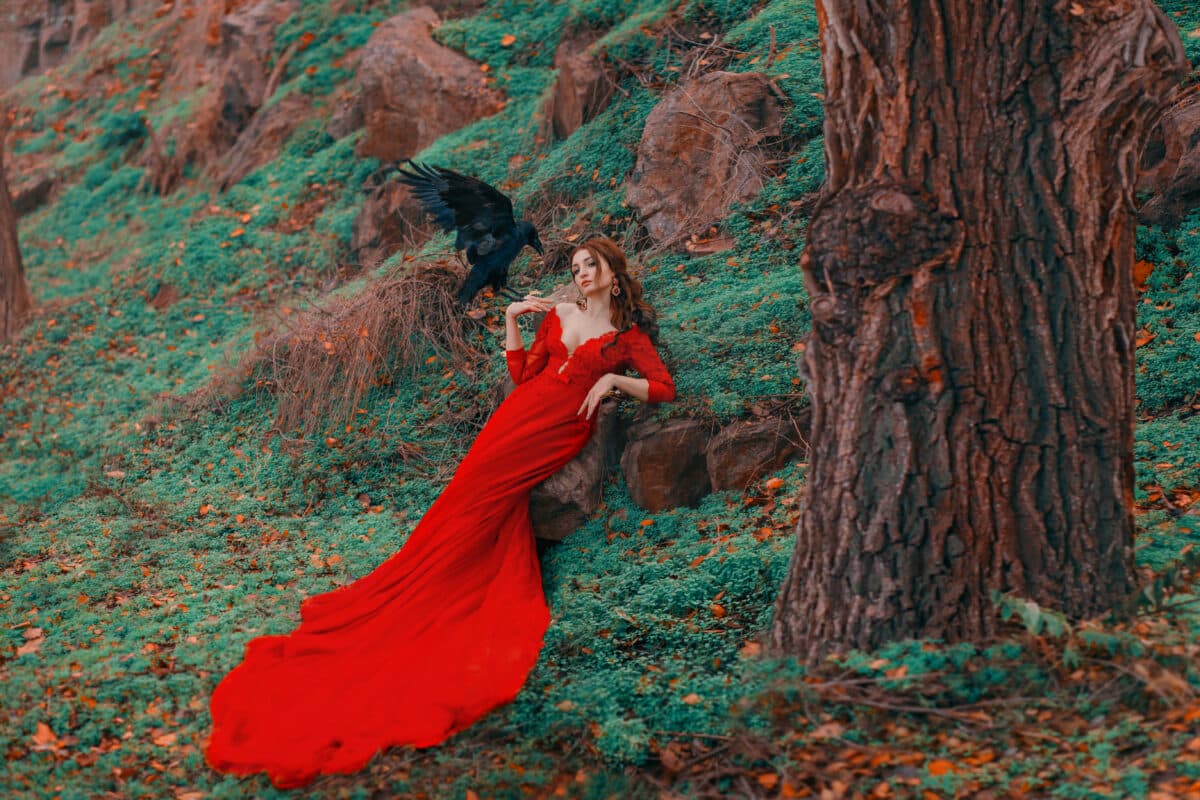
“Love” by Kahlil Gibran
They say the jackal and the mole
Drink from the selfsame stream
Where the lion comes to drink.
And they say the eagle and the vulture
Dig their beaks into the same carcass,
And are at peace, one with the other,
In the presence of the dead thing.
O love, whose lordly hand
Has bridled my desires,
And raised my hunger and my thirst
To dignity and pride,
Let not the strong in me and the constant
Eat the bread or drink the wine
That tempt my weaker self.
Let me rather starve,
And let my heart parch with thirst,
And let me die and perish,
Ere I stretch my hand
To a cup you did not fill,
Or a bowl you did not bless.
“On Marriage” by Kahlil Gibran
Then Almitra spoke again and said, And what of Marriage, master?
And he answered saying:
You were born together, and together you shall be forevermore.
You shall be together when the white wings of death scatter your days.
Ay, you shall be together even in the silent memory of God.
But let there be spaces in your togetherness,
And let the winds of the heavens dance between you.
Love one another, but make not a bond of love:
Let it rather be a moving sea between the shores of your souls.
Fill each other’s cup but drink not from one cup.
Give one another of your bread but eat not from the same loaf.
Sing and dance together and be joyous, but let each one of your be alone,
Even as the strings of the lute are alone though they quiver with the same music.
Give your hearts, but not into each other’s keeping.
For only the hand of Life can contain your hearts.
And stand together yet not too near together:
For the pillars of the temple stand apart,
And the oak tree and the cypress grow not in each other’s shadow.
“Till Death Us Part” by Arthur Penrhyn Stanley
“Till death us part,”
Thus speaks the heart
When each to each repeats the words of doom;
For better and for worse,
Through blessing and through curse,
We shall be one, till life’s last hour shall come.
Life with its myriad grasp
Our yearning souls shall clasp
By ceaseless love and still expectant wonder;
In bonds that shall endure
Indissolubly sure
Till God in death shall part our paths asunder.
Till death us join!
Oh, word yet more divine,
Which to the breaking heart breathes hope sublime!
Through wasted hours,
And shattered powers,
We still are one, despite the change and time.
Death with his healing hand
Shall knit once more the band,
Which needs but that one link that none may sever;
Till, through the only Good,
Seen, felt, and understood,
The life in God shall make us one forever.

“Love’s Fidelity” by Francesco Petrarca (Earl of Surrey, Translator)
Set me whereas the sun doth parch the green,
Or where his beams do not dissolve the ice:
In temperate heat, where he is felt and seen;
In presence prest of people mad or wise;
Set me in high, or yet in low degree;
In longest night, or in the shortest day;
In clearest sky, or where clouds thickest be;
In lusty youth, or when my hairs are grey:
Set me in heaven, in earth, or else in hell,
In hill or dale, or in the foaming flood;
Thrall, or at large, alive whereso I dwell,
Sick or in health, in evil fame or good,
Hers will I be; and only with this thought
Content myself although my chance be nought.
“My Wife” by Robert Louis Stevenson
Trusty, dusky, vivid, true,
With eyes of gold and bramble-dew,
Steel-true and blade-straight,
The great artificer
Made my mate.
Honour, anger, valour, fire;
A love that life could never tire,
Death quench or evil stir,
The mighty master
Gave to her.
Teacher, tender, comrade, wife,
A fellow-farer true through life,
Heart-whole and soul-free
The august father
Gave to me.
“To My Dear and Loving Husband” by Anne Bradstreet
If ever two were one, then surely we.
If ever man were loved by wife, then thee;
If ever wife was happy in a man,
Compare with me ye women if you can.
I prize thy love more than whole mines of gold,
Or all the riches that the East doth hold.
My love is such that rivers cannot quench,
Nor ought but love from thee give recompense.
Thy love is such I can no way repay;
The heavens reward thee manifold, I pray.
Then while we live, in love let’s so persever,
That when we live no more we may live ever.
Poems About Loyalty and Betrayal

“Romero” by William Cullen Bryant
When freedom, from the land of Spain,
By Spain’s degenerate sons was driven,
Who gave their willing limbs again
To wear the chain so lately riven;
Romero broke the sword he wore—
“Go, faithful brand,” the warrior said,
“Go, undishonoured, never more
The blood of man shall make thee red:
I grieve for that already shed;
And I am sick at heart to know,
That faithful friend and noble foe
Have only bled to make more strong
The yoke that Spain has worn so long.
Wear it who will, in abject fear—
I wear it not who have been free;
The perjured Ferdinand shall hear
No oath of loyalty from me.”
Then, hunted by the hounds of power,
Romero chose a safe retreat,
Where bleak Nevada’s summits tower
Above the beauty at their feet.
There once, when on his cabin lay
The crimson light of setting day,
When even on the mountain’s breast
The chainless winds were all at rest,
And he could hear the river’s flow
From the calm paradise below;
Warmed with his former fires again,
He framed this rude but solemn strain:
“Fidelis” by Adelaide Ann Procter
You have taken back the promise
That you spoke so long ago;
Taken back the heart you gave me—
I must even let it go.
Where Love once has breathed, Pride dieth:
So I struggled, but in vain,
First to keep the links together,
Then to piece the broken chain.
But it might not be—so freely
All your friendship I restore,
And the heart that I had taken
As my own for evermore.
No shade of reproach shall touch you,
Dread no more a claim from me—
But I will not have you fancy
That I count myself as free.
I am bound by the old promise;
What can break that golden chain?
Not even the words that you have spoken,
Or the sharpness of my pain:
Do you think, because you fail me
And draw back your hand to-day,
That from out the heart I gave you
My strong love can fade away?
It will live. No eyes may see it;
In my soul it will lie deep,
Hidden from all; but I shall feel it
Often stirring in its sleep.
So remember, that the friendship
Which you now think poor and vain,
Will endure in hope and patience,
Till you ask for it again.
Perhaps in some long twilight hour,
Like those we have known of old,
When past shadows gather round you,
And your present friends grow cold,
You may stretch your hands out towards me,—
Ah! you will—I know not when—
I shall nurse my love and keep it
Faithfully, for you, till then.
“The Betrayal” by Alice Furlong
When you were weary, roaming the wide world, over,
I gave my fickle heart to a new lover.
Now they tell me that you are lying dead:
O mountains fall on me and hide my head!
When you lay burning in the throes of fever,
He vowed me love by the willow-margined river:
Death smote you there—here was your trust betrayed,
O darkness, cover me, I am afraid!
Yea, in the hour of your supremest trial,
I laughed with him! The shadows on the dial
Stayed not, aghast at my dread ignorance:
Nor man nor angel looked at me askance.
Under the mountains there is peace abiding,
Darkness shall be pavilion for my hiding,
Tears shall blot out the sin of broken faith,
The lips that falsely kissed, shall kiss but Death.

“Disloyal” by Laurence Hope (Adela Florence Nicolson)
You were more than a Lover to me,—
Were something sacred, and half divine,—
Akin to Sunset over the Sea,
To leaves that tremble and stars that shine.
There was not much to attract in me,
No gift or beauty; you did not care
Enough to give me fidelity
Who cared so deeply, and could not share.
Alas, my Temple! I find the Shrine
I entered barefoot, with bended head,
To pay that tender homage of mine,
An open courtyard, where all may tread!
And all men knew it, I hear, but I,
Who being a trusting fool, it seems,
Went to the Market of Love to buy
With coins of worship, and faith, and dreams!
Still it is over. Now, to forget!
I know not whether to choose anew
In hopes of finding loyalty yet,
Or, fond but faithless, drift on with you.
Loving you lightly, among the rest,—
(Many a little, not greatly one),—
You may be right: I may find it best
To do, henceforward, as you have done.
But ah, for my sweet, lost nights with you,
When had Death been, in the dawning grey,
Price of your beauty and love, I knew
I would have paid, and been glad to pay!
“Sonnet XXIII.” by Francesco Petrarca (Petrarch)
The high successor of our Charles,whose hair
The crown of his great ancestor adorns,
Already has ta’en arms, to bruise the horns
Of Babylon, and all her name who bear;
Christ’s holy vicar with the honour’d load
Of keys and cloak, returning to his home,
Shall see Bologna and our noble Rome,
If no ill fortune bar his further road.
Best to your meek and high-born lamb belongs
To beat the fierce wolf down: so may it be
With all who loyalty and love deny.
Console at length your waiting country’s wrongs,
And Rome’s, who longs once more her spouse to see,
And gird for Christ the good sword on thy thigh.
“Naimechka or The Servant” by Taras Shevchenko
All by themselves lived
an old couple fond
In a nice little grove
just by a millpond.
Like birds of a feather
Just always together,
From childhood the two of them
fed sheep together,
Got married, got wealthy,
got houses and lands,
Got a beautiful garden
just where the mill stands,
An apiary full
of beehives like boulders.
Yet no children were theirs,
and death at their shoulders.
Who will cheer their passing years?
Who will soothe their mortal fears?
Who will guard their gathered treasure.
In loyal service find his pleasure?
Who will be their faithful son
When low their sands of life do run?
Hard it is a child to rear,
In roofless house ’mid want and fear.
Yet just as hard ’mid gathered wealth,
When death creeps on with crafty stealth,
And one’s treasures good
At end of life’s wandering,
Are for strangers rude
For mocking and squandering.
Poems About Loyalty That Rhyme

“Loyalty of Woodbridge” by William Stygall
The loyal men of Suffolk to Woodbridge they did go,
On the eighth of July to see a gallant show,
For there were such doings as ne er were known before,
And if you hundred years you ll see the like live an no more.
Fifteen hundred of the inhabitants din d in the market place
Off plum pudding and roast beef in remembrance of this peace;
Men women and their children all eat there very hearty,
And after dinner made a fire for to burn Bonaparte.
When the gentlemen had din d the bells were set a ringing
They had pipes and tobacco and much jovial singing
Then a toast they all drank it was a noble thing
The gallant “Duke of Wellington” and sung “God save the King”
When Bonaparte was in flames how the fire blaz’d
The gentlemen laugh d very much they were se greatly pleas’d;
The ladies at the windows stood and lifted up the sashes
And clap d their hands and all cried out “burn the rogue to ashes!”
But who can now repeat all the sports of that day,
The mirth and the fun with which the time was pass’d away;
So full was the town with people great and small,
That of all the sights in England surely Woodbridge beats them all.
“Life’s Mirror” by Madeline S. Bridges.
There are loyal hearts, there are spirits brave,
There are souls that are pure and true;
Then give to the world the best you have,
And the best will come back to you.
Give love, and love to your life will flow,
A strength in your utmost need;
Have faith, and a score of hearts will show
Their faith in your work and deed.
Give truth, and your gift will be paid in kind;
And honor will honor meet,
And the smile which is sweet will surely find
A smile that is just as sweet.
Give pity and sorrow to those who mourn;
You will gather in flowers again
The scattered seeds from your thought outborne,
Though the sowing seemed in vain.
For life is the mirror of king and slave;
‘Tis just what we are and do;
Then give to the world the best you have,
And the best will come back to you.
“Song of Saul Before His Last Battle” by Lord Byron
Warriors and chiefs! should the shaft or sword
Pierce me in leading the host of the Lord,
Heed not the corse, though a king’s, in your path:
Bury your steel in the bosoms of Gath!
Thou who art bearing my buckler and bow,
Should the soldiers of Saul look away from the foe,
Stretch me that moment in blood at thy feet!
Mine be the doom which they dared not to meet.
Farewell to others, but never we part,
Heir to my royalty, son of my heart:
Bright is the diadem, boundless the sway,
Or kingly the death, which awaits us to-day!

“Faithful unto Death” by R. H. Titherington
His work is done, his toil is o’er;
A martyr for our land he fell—
The land he loved, that loved him well;
Honor his name forevermore!
Let all the world its tribute pay,
For glorious shall be his renown;
Though duty’s was his only crown,
Yet duty’s path is glory’s way.
For he was great without pretense;
A man of whom none whispered shame,
A man who knew nor guile nor blame;
Good in his every influence.
On battle field, in council hall,
Long years with sterling service rife
He gave us, and at last his life—
Still unafraid at duty’s call.
Let the last solemn pageant move,
The nation’s grief to consecrate
To him struck down by maniac hate
Amid a mighty nation’s love;
And though the thought its solace gives,
Beside the martyr’s grave to-day
We feel ’tis almost hard to say:
“God reigns and the republic lives!”
“I shall be faithful, though the weary years” by George Henry Boker
I shall be faithful, though the weary years
Spread out before me like a mountain chain
Rugged and steep, ascending from the plain,
Without a path; though where the cliff uprears
Its sternest front, and echoes in my ears
My own deep sobs of solitary pain,
It is my fate to scale; though all in vain
I spend my labour, and my idle tears
Torture but me: I know, despite my ill,
That with each step a little wastes away—
A little of this life wastes day by day;
And far beyond the desert which I fill
With my vast sorrow, I have faith to say
That we shall meet; so I press onward still.
“The Loyal Delights of a Contented Mind” by Anonymous
Oh, how Happy’s he, who from Business free,
Can Enjoy his Mistress, Bottle, and his Friend:
Not confined to State, nor the Pride of the Great;
Only on himself, not others doth depend:
Change can never vex him, Faction ne’er perplex him:
If the World goes well, a Bumper crowns his Joys,
If it be not so than he takes of two;
Till succeeding Glasses, Thinking doth destroy.
When his Noddle reels, he to Cælia steals;
And by Pleasures unconfined runs o’er the Night;
In the Morning wakes, a pleasing Farewell takes,
Ready for fresh Tipling, and for new Delight:
When his Table’s full, oh, then he hugs his Soul;
And drinking all their Healths, a Welcome doth express:
When the Cloth’s removed, then by all approved,
Comes the full grace Cup, Queen Anna’s good success.

“Prologue to The Loyal General” by John Dryden
If yet there be a few that take delight
In that which reasonable Men should write,
To them Alone we Dedicate this Night.
The Rest may satisfie their curious Itch
With City Gazets, or some Factious Speech,
Or what-ere Libel, for the Publick Good,
Stirs up the Shrove-tide Crew to Fire and Blood.
Remove your Benches, you apostate Pit,
And take Above, twelve penny-worth of Wit:
Go back to your dear Dancing on the Rope,
Or see what’s worse, the Devil and the Pope!
The Plays that take on our Corrupted Stage,
Methinks, resemble the distracted Age;
Noise, Madness, all unreasonable Things,
That strike at Sense, as Rebels do at Kings!
The stile of Forty One our Poets write,
And you are grown to judge like Forty Eight.
Such Censures our mistaking Audience make,
That ’tis almost grown scandalous to take.
They talk of Feavours that infect the Brains;
But Non-sence is the new Disease that reigns.
Weak Stomachs, with a long Disease opprest,
Cannot the Cordials of strong Wit digest;
Therefore thin Nourishment of Farce ye choose,
Decoctions of a Barly-water Muse:
A Meal of Tragedy wou’d make ye Sick,
Unless it were a very tender Chick.
Some Scenes in Sippets would be worth our time:
Those wou’d go down; some Love that’s poach’d in Rime;
If these shou’d fail——
We must lie down, and, after all our cost,
Keep Holy-day, like Water-men in Frost;
Whilst you turn Players on the Worlds great Stage,
And Act your selves the Farce of your own Age.
“In Equal Sacrifice” by Robert Frost
Thus of old the Douglas did:
He left his land as he was bid
With the royal heart of Robert the Bruce
In a golden case with a golden lid,
To carry the same to the Holy Land;
By which we see and understand
That that was the place to carry a heart
At loyalty and love’s command,
And that was the case to carry it in.
The Douglas had not far to win
Before he came to the land of Spain,
Where long a holy war had been
Against the too-victorious Moor;
And there his courage could not endure
Not to strike a blow for God
Before he made his errand sure.
And ever it was intended so,
That a man for God should strike a blow,
No matter the heart he has in charge
For the Holy Land where hearts should go.
But when in battle the foe were met,
The Douglas found him sore beset,
With only strength of the fighting arm
For one more battle passage yet—
And that as vain to save the day
As bring his body safe away—
Only a signal deed to do
And a last sounding word to say.
The heart he wore in a golden chain
He swung and flung forth into the plain,
And followed it crying ‘Heart or death!’
And fighting over it perished fain.
So may another do of right,
Give a heart to the hopeless fight,
The more of right the more he loves;
So may another redouble might
For a few swift gleams of the angry brand,
Scorning greatly not to demand
In equal sacrifice with his
The heart he bore to the Holy Land
“The Dog” by R. E. Barrett
Of all the beasts beneath the sun
There is no other, not a one,
That clings to man in sweet and bitter
As faithful as the canine critter.
When fortune smiles upon its crest
And all your toil is richly blest
The loyal dog is near at hand
For slightest duty or command.
When poverty comes stalking in
And you have lost your precious tin,
The good old dog is just the same
In dire distress or glittering fame.
In tattered rags or spick and span
He has a truer heart than man,
And when you meet most keen defeat
His sympathy is there to greet.
When you are old and had your day,
With feeble limbs and head of gray,
And angels come to take you home,
The good old dog is last to roam.
He’ll watch beneath the stars at night
Beside your grave a sadful sight,
And wait and wait for many a day,
When faded flowers have blown away.
A dog’s great love is most sublime,
It lingers near the word divine,
And intertwines from him above,
For dog turned around is God and love.

“Dream” by Heinrich Heine
Son of folly, dream thou ever,
When thy thoughts within thee burn;
But in life thy visions never
To reality will turn.
Once in happier days chance bore me
To a high mount on the Rhine;
Smiling lay the land before me,
Gloriously the sun did shine.
Far below, the waves were singing
Wild and magic melodies;
In my inmost heart were ringing
Blissful strains in wondrous wise.
Now, when gazing from that station
On the land—how sad its doom!
I but see a pigmy nation
Crawling on a giant’s tomb.
So-call’d men wear silken raiment,
Deem themselves the nation’s flower;
Honours now are gain’d by payment,
Rogues possess both wealth and power.
Of descent they boast, not merit,
’Tis their dress that makes them men;
Old coats now alone the spirit
Of old times bring back again;
When respect and virtue holy
Modestly went hand in hand;
When the youth with deference lowly
By the aged took his stand;
When a hand-shake was more valid
Than an oath or written sheet;
When men, iron-clad, forth sallied,
And a heart inside them beat.
Our fair garden borders nourish
Many a thousand flow’rets fair;
In the fostering soil they flourish,
While the sun smiles on them there.
But the flower most fair, most golden,
In our gardens ne’er is known,—
That one which, in days now olden,
On each rocky height was grown;
Which, in cold hill-fortress dwelling,
Men endued with iron frame
Deem’d the flower all flowers excelling,—
Hospitality its name.
Weary wanderer, never clamber
To the mountain’s fort-crown’d brow;
’Stead of warm and friendly chamber,
Cold, hard walls receive thee now.
From the watch-tower blow no warders
Not a drawbridge is let fall;
For the castle’s lord and warders
In the cold tomb slumber all.
In dark coffins, too, are sleeping
Those dear maids bards sang of old;
Shrines like these within them keeping
Greater wealth than pearls and gold.
Strange soft whispers there are blended
Like sweet minnesinger’s lays;
To those dark vaults has descended
The fair love of olden days.
True, I also prize our ladies,
For they blossom like the May;
And delightful, too, their trade is,—
’Tis to dance, stitch, paint all day.
And they sing, in rhymes delicious,
Of old love and loyalty,
Feeling all the time suspicious
Whether such things e’er could be.
In their simple minds, our mothers
Used to think in days of yore,
That the gem above all others
Fair, man in his bosom bore.
Very different from this is
What their daughters wisdom call;
In the present day our misses
Love the jewels most of all.
Lies, deceit, and superstition
Rule,—life’s charms are thrown aside,
Whilst Rome’s sordid base ambition
Jordan’s pearls has falsified.
To your dark domain return you,
Visions of far happier days;
O’er a time which thus doth spurn you,
Vain laments no longer raise!
“The Kid Has Gone to the Colors” by W.M. Herschell
The Kid has gone to the Colors
And we don’t know what to say;
The Kid we have loved and cuddled
Stepped out for the Flag to-day.
We thought him a child, a baby
With never a care at all,
But his country called him man-size
And the Kid has heard the call.
He paused to watch the recruiting,
Where, fired by the fife and drum,
He bowed his head to Old Glory
And thought that it whispered: “Come!”
The Kid, not being a slacker,
Stood forth with patriot-joy
To add his name to the roster—
And God, we’re proud of the boy!
The Kid has gone to the Colors;
It seems but a little while
Since he drilled a schoolboy army
In a truly martial style,
But now he’s a man, a soldier,
And we lend him a listening ear,
For his heart is a heart all loyal,
Unscourged by the curse of fear.
His dad, when he told him, shuddered,
His mother—God bless her!—cried;
Yet, blest with a mother-nature,
She wept with a mother-pride,
But he whose old shoulders straightened
Was Granddad—for memory ran
To years when he, too, a youngster,
Was changed by the Flag to a man!
“Verse for a Certain Dog” by Dorothy Parker
Such glorious faith as fills your limpid eyes,
Dear little friend of mine, I never knew.
All-innocent are you, and yet all-wise.
(For heaven’s sake, stop worrying that shoe!)
You look about, and all you see is fair;
This mighty globe was made for you alone.
Of all the thunderous ages, you’re the heir.
(Get off the pillow with that dirty bone!)
A skeptic world you face with steady gaze;
High in young pride you hold your noble head;
Gayly you meet the rush of roaring days.
(Must you eat puppy biscuit on the bed?)
Lancelike your courage, gleaming swift and strong,
Yours the white rapture of a wingèd soul,
Yours is a spirit like a May-day song.
(God help you, if you break the goldfish bowl!)
“Whatever is, is good,” your gracious creed.
You wear your joy of living like a crown.
Love lights your simplest act, your every deed.
(Drop it, I tell you—put that kitten down!)
You are God’s kindliest gift of all,—a friend.
Your shining loyalty unflecked by doubt,
You ask but leave to follow to the end.
(Couldn’t you wait until I took you out?)
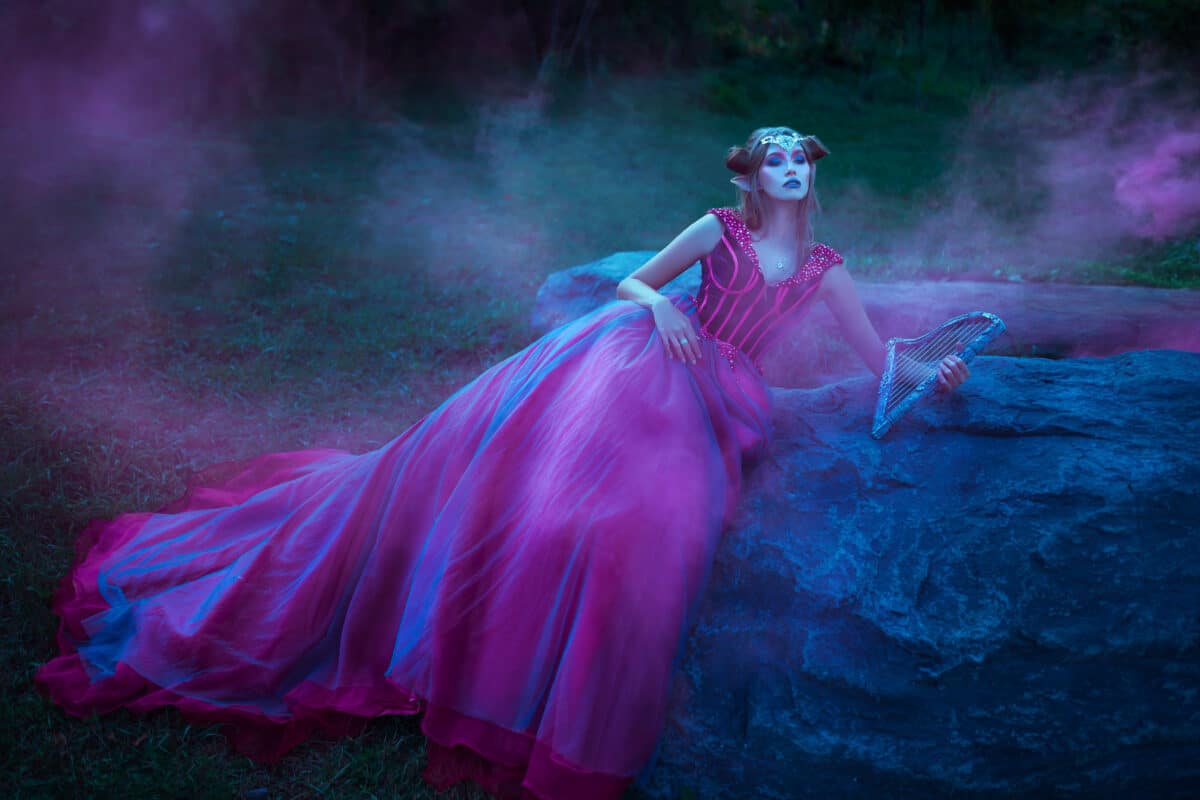
“One Dignity Delays For All,” by Emily Elizabeth Dickinson
One dignity delays for all,
One mitred afternoon.
None can avoid this purple,
None evade this crown.
Coach it insures, and footmen,
Chamber and state and throng;
Bells, also, in the village,
As we ride grand along.
What dignified attendants,
What service when we pause!
How loyally at parting
Their hundred hats they raise!
How pomp surpassing ermine,
When simple you and I
Present our meek escutcheon,
And claim the rank to die!
“The Knight’s Toast” by Sir Walter Scott
The feast is o’er! Now brimming wine
In lordly cup is seen to shine
Before each eager guest;
And silence fills the crowded hall,
As deep as when the herald’s call
Thrills in the loyal breast.
Then up arose the noble host,
And, smiling, cried: “A toast! a toast!
To all our ladies fair!
Here before all, I pledge the name
Of Staunton’s proud and beauteous dame,
The Ladye Gundamere!”
Then to his feet each gallant sprung,
And joyous was the shout that rung,
As Stanley gave the word;
And every cup was raised on high,
Nor ceased the loud and gladsome cry
Till Stanley’s voice was heard.
“Enough, enough,” he, smiling, said,
And lowly bent his haughty head;
“That all may have their due,
Now each in turn must play his part,
And pledge the lady of his heart,
Like gallant knight and true!”
Then one by one each guest sprang up,
And drained in turn the brimming cup,
And named the loved one’s name;
And each, as hand on high he raised,
His lady’s grace or beauty praised,
Her constancy and fame.
‘Tis now St. Leon’s turn to rise;
On him are fixed those countless eyes;—
A gallant knight is he;
Envied by some, admired by all,
Far famed in lady’s bower and hall,—
The flower of chivalry.
St. Leon raised his kindling eye,
And lifts the sparkling cup on high:
“I drink to one,” he said,
“Whose image never may depart,
Deep graven on this grateful heart,
Till memory be dead.
“To one, whose love for me shall last
When lighter passions long have past,—
So holy ’tis and true;
To one, whose love hath longer dwelt,
More deeply fixed, more keenly felt,
Than any pledged by you.”
Each guest upstarted at the word,
And laid a hand upon his sword,
With fury flashing eye;
And Stanley said: “We crave the name,
Proud knight, of this most peerless dame,
Whose love you count so high.”
St. Leon paused, as if he would
Not breathe her name in careless mood,
Thus lightly to another;
Then bent his noble head, as though
To give that word the reverence due,
And gently said: “My Mother!”
“Our Flag” by Margaret E. Sangster
Fling it from mast and steeple,
Symbol o’er land and sea
Of the life of a happy people,
Gallant and strong and free.
Proudly we view its colors,
Flag of the brave and true,
With the clustered stars and the steadfast bars,
The red, the white, and the blue.
Flag of the fearless-hearted,
Flag of the broken chain,
Flag in a day-dawn started,
Never to pale or wane.
Dearly we prize its colors,
With the heaven light breaking through,
The clustered stars and the steadfast bars,
The red, the white, and the blue.
Flag of the sturdy fathers,
Flag of the loyal sons,
Beneath its folds it gathers
Earth’s best and noblest ones.
Boldly we wave its colors,
Our veins are thrilled anew
By the steadfast bars, the clustered stars,
The red, the white, and the blue.
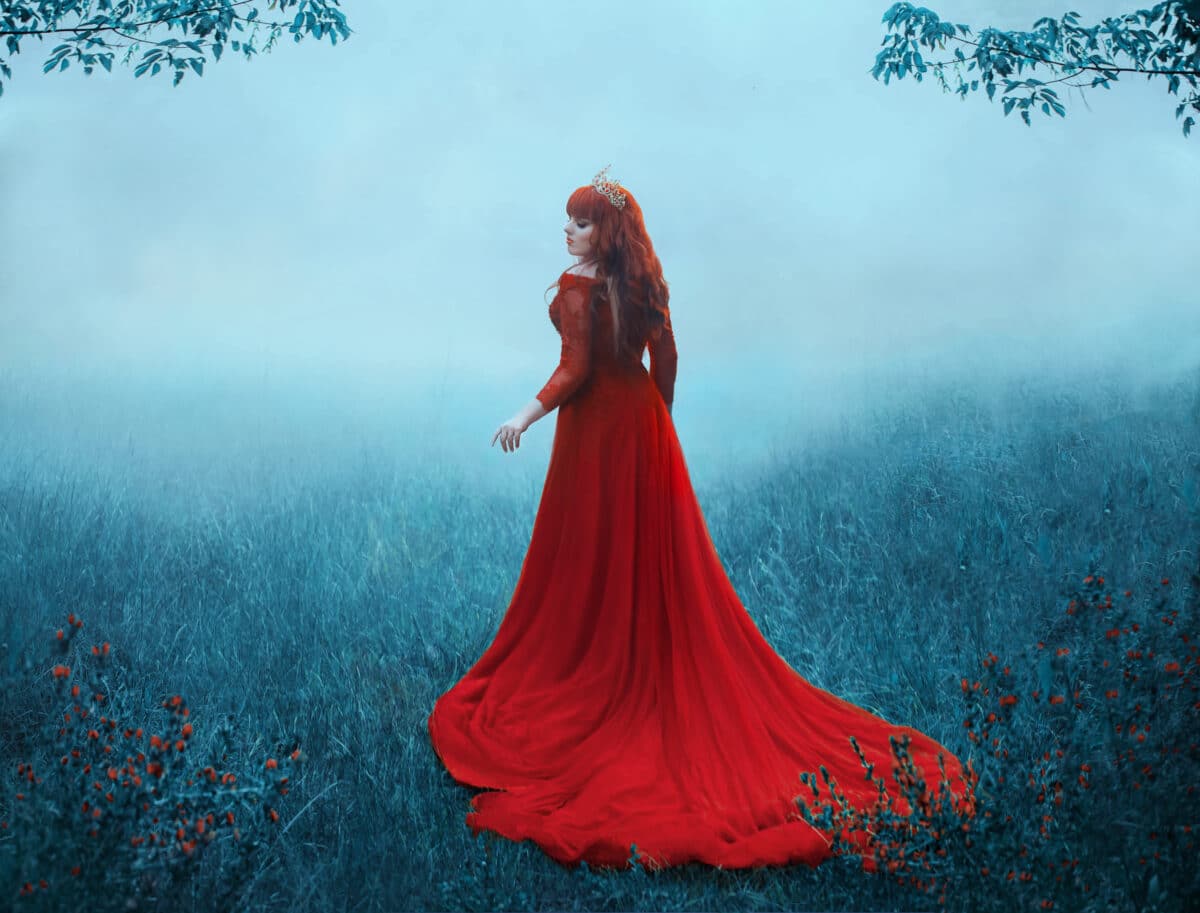
“Death Has Crowned Him A Martyr” by Ella Wheeler Wilcox
In the midst of sunny waters, lo! the mighty Ship of State
Staggers, bruised and torn and wounded by a derelict of fate,
One that drifted from its moorings in the anchorage of hate.
On the deck our noble Pilot, in the glory of his prime,
Lies in woe-impelling silence, dead before his hour or time,
Victim of a mind self-centred in a Godless fool of crime.
One of earth’s dissension-breeders, one of Hate’s unreasoning tools,
In the annals of the ages, when the world’s hot anger cools,
He who sought for Crime’s distinction shall be known as Chief of Fools.
In the annals of the ages, he who had no thought of fame
(Keeping on the path of duty, caring not for praise or blame),
Close beside the deathless Lincoln, writ in light, will shine his name.
Youth proclaimed him as a hero; time, a statesman; love, a man;
Death has crowned him as a martyr,—so from goal to goal he ran,
Knowing all the sum of glory that a human life may span.
He was chosen by the people; not an accident of birth
Made him ruler of a nation, but his own intrinsic worth.
Fools may govern over kingdoms—not republics of the earth.
He has raised the lovers’ standard by his loyalty and faith,
He has shown how virile manhood may keep free from scandal’s breath.
He has gazed, with trust unshaken, in the awful eyes of Death.
In the mighty march of progress he has sought to do his best.
Let his enemies be silent, as we lay him down to rest,
And may God assuage the anguish of one suffering woman’s breast.
“The Negro Soldiers” by Roscoe C. Jamison
These truly are the Brave,
These men who cast aside
Old memories, to walk the blood-stained pave
Of Sacrifice, joining the solemn tide
That moves away, to suffer and to die
For Freedom—when their own is yet denied!
O Pride! O Prejudice! When they pass by,
Hail them, the Brave, for you now crucified!
These truly are the Free,
These souls that grandly rise
Above base dreams of vengeance for their wrongs,
Who march to war with visions in their eyes
Of Peace through Brotherhood, lifting glad songs,
Aforetime, while they front the firing line.
Stand and behold! They take the field to-day,
Shedding their blood like Him now held divine,
That those who mock might find a better way!
From “The Dog.” by William Hayley
Of all the speechless friends of man
The faithful dog I deem
Deserving from the human clan
The tenderest esteem:
This feeling creature form’d to love,
To watch, and to defend,
Was given to man by powers above,
A guardian, and a friend!
I sing, of all e’er known to live
The truest friend canine;
And glory if my verse may give,
Brave Fido! it is thine.
A dog of many a sportive trick,
Tho’ rough and large of limb.
Fido would chase the floating stick
When Lucy cried, “go swim.”
And what command could Lucy give,
Her dog would not obey?
For her it seemed his pride to live,
Blest in her gentle sway!
For conscious of her every care
He strain’d each feeling nerve,
To please that friend, his lady fair
Commanded him to serve.
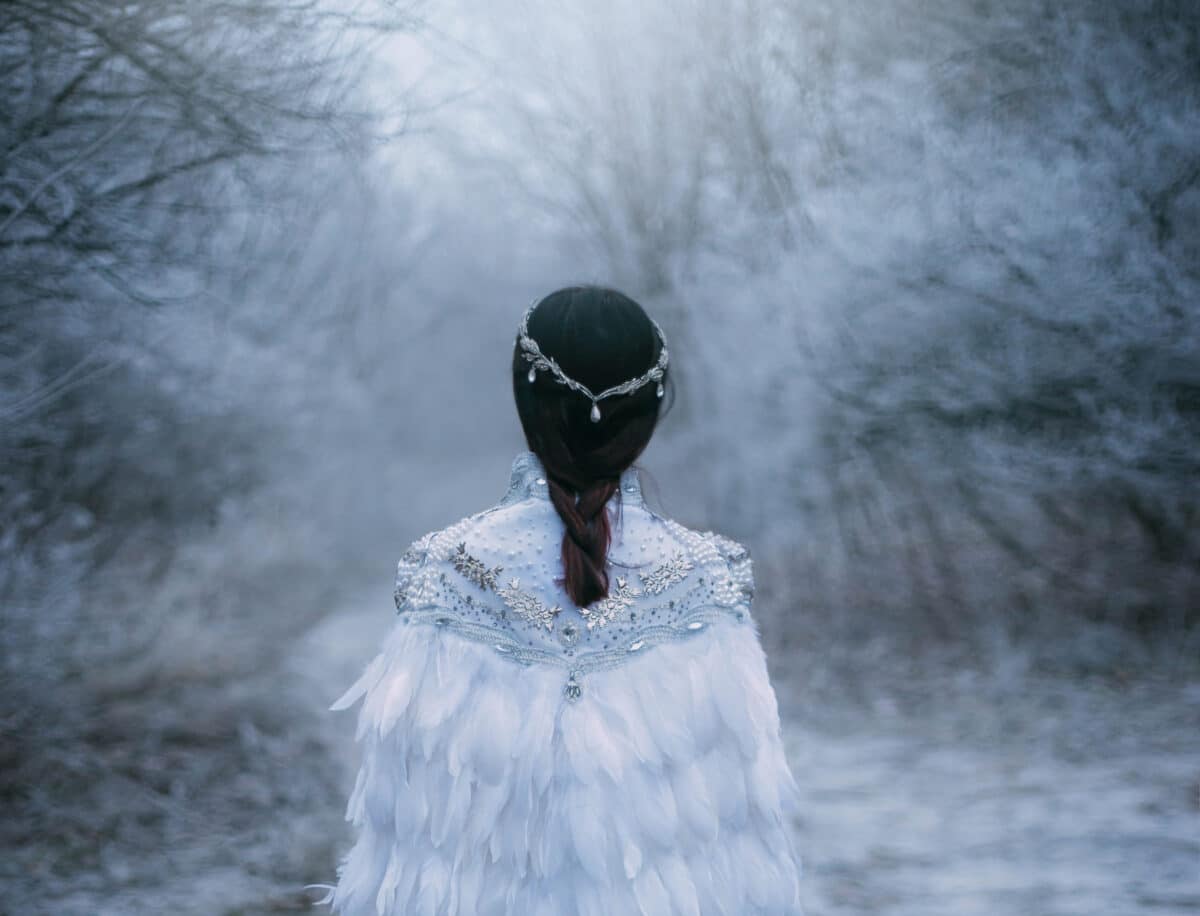
“Loyalty” by Frederick Lucian Hosmer
When courage fails and faith burns low,
And men are timid grown,
Hold fast thy loyalty and know
That Truth still moveth on.
For unseen messengers she hath,
To work her will and ways,
And even human scorn and wrath
God turneth to her praise.
She can both meek and lordly be,
In heavenly might secure;
With her is pledge of victory,
And patience to endure.
The race is not unto the swift,
The battle to the strong,
When dawn her judgment-days that sift
The claims of right and wrong.
And more than thou canst do for Truth
Can she on thee confer,
If thou, O heart, but give thy youth
And manhood unto her.
For she can make thee inly bright,
Thy self-love purge away,
And lead thee in the path whose light
Shines to the perfect day.
Who follow her, though men deride,
In her strength shall be strong;
Shall see their shame become their pride,
And share her triumph song!
Poems About Loyalty and Friendship

“My Comrade” by James Jeffrey Roche
The love of man and woman is as fire,
To warm, to light, but surely to consume
And self-consuming die. There is no room
For constancy and passionate desire.
We stand at last beside a wasted pyre,
Touch its dead embers, groping in the gloom;
And where an altar stood, erect a tomb,
And sing a requiem to a broken lyre.
But comrade-love is as a welding blast
Of candid flame and ardent temperature:
Glowing most fervent, it doth bind more fast;
And melting both, but makes the union sure.
The dross alone is burnt—till at the last
The steel, if cold, is one, and strong and pure.
From “Hamlet, Act III. Sc. 2.” by William Shakespeare
HAMLET.—Horatio, thou art e’en as just a man
As e’er my conversation coped withal.
HORATIO.—O my dear lord—
HAMLET.—Nay, do not think I flatter:
For what advancement may I hope from thee
That no revènue hast but thy good spirits,
To feed and clothe thee? Why should the poor be flattered?
No, let the candied tongue lick absurd pomp,
And crook the pregnant hinges of the knee,
Where thrift may follow fawning. Dost thou hear?
Since my dear soul was mistress of her choice,
And could of men distinguish, her election
Hath sealed thee for herself; for thou hast been
As one, in suffering all, that suffers nothing,—
A man that Fortune’s buffets and rewards
Hast ta’en with equal thanks; and blessed are those
Whose blood and judgment are so well commingled,
That they are not a pipe for Fortune’s finger
To sound what stop she please: Give me that man
That is not passion’s slave, and I will wear him
In my heart’s core, ay, in my heart of heart,
As I do thee.
“Early Friendship” by Aubrey Thomas de Vere
The half-seen memories of childish days,
When pains and pleasures lightly came and went;
The sympathies of boyhood rashly spent
In fearful wanderings through forbidden ways;
The vague, but manly wish to tread the maze
Of life to noble ends,—whereon intent,
Asking to know for what man here is sent,
The bravest heart must often pause, and gaze;
The firm resolve to seek the chosen end
Of manhood’s judgment, cautious and mature,—
Each of these viewless bonds binds friend to friend
With strength no selfish purpose can secure:
My happy lot is this, that all attend
That friendship which first came, and which shall last endure.

“Friendship” by Ralph Waldo Emerson
A ruddy drop of manly blood
The surging sea outweighs;
The world uncertain comes and goes,
The lover rooted stays.
I fancied he was fled,—
And, after many a year,
Glowed unexhausted kindliness,
Like daily sunrise there.
My careful heart was free again;
O friend, my bosom said,
Through thee alone the sky is arched,
Through thee the rose is red;
All things through thee take nobler form,
And look beyond the earth;
The mill-round of our fate appears
A sun-path in thy worth.
Me too thy nobleness has taught
To master my despair;
The fountains of my hidden life
Are through thy friendship fair.
From “The Faithful Shepherdess” by John Fletcher
Though divinest, fairest, brightest,
Thou most powerful maid and whitest,
Thou most virtuous and most blessed,
Eyes of stars, and golden tressed
Like Apollo! tell me, sweetest,
What new service now is meetest
For the Satyr? Shall I stray
In the middle air, and stay
The sailing rack, or nimbly take
Hold by the moon, and gently make
Suit to the pale queen of night
For a beam to give thee light?
Shall I dive into the sea
And bring thee coral, making way
Through the rising waves that fall
Like snowy fleeces? Dearest, shall
I catch thee wanton fawns, or flies
Whose woven wings the summer dyes
Of many colours? get thee fruit,
Or steal from heaven old Orpheus’ lute?
All these I ’ll venture for, and more,
To do her service all these woods adore.
“On Loyalty To Absent Friends” by Anonymous
He who, malignant, tears an absent friend,
Or fails, when others blame him, to defend,
Who trivial bursts of laughter strives to raise
And courts for witty cynicism praise,
Who can, what he has never seen, reveal,
And friendship’s secrets knows not to conceal—
Romans beware—that man is black of soul.

“Fidelity” by William Wordsworth
A barking sound the Shepherd hears,
A cry as of a dog or fox;
He halts and searches with his eyes
Among the scattered rocks:
And now at distance can discern
A stirring in a brake of fern;
And instantly a dog is seen,
Glancing through that covert green.
The Dog is not of mountain breed;
Its motions, too, are wild and shy;
With something, as the Shepherd thinks,
Unusual in its cry:
Nor is there any one in sight
All round, in hollow or on height;
Nor shout, nor whistle strikes his ear;
What is the creature doing here?
It was a cove, a huge recess,
That keeps, till June, December’s snow;
A lofty precipice in front,
A silent tarn below!
Far in the bosom of Helvellyn,
Remote from public road or dwelling,
Pathway, or cultivated land;
From trace of human foot or hand.
There sometimes doth a leaping fish
Send through the tarn a lonely cheer;
The crags repeat the raven’s croak,
In symphony austere;
Thither the rainbow comes the cloud
And mists that spread the flying shroud;
And sunbeams; and the sounding blast,
That, if it could, would hurry past;
But that enormous barrier holds it fast.
Not free from boding thoughts, a while
The Shepherd stood; then makes his way
O’er rocks and stones, following the Dog
As quickly as he may;
Nor far had gone before he found
A human skeleton on the ground;
The appalled Discoverer with a sigh
Looks round, to learn the history.
From those abrupt and perilous rocks
The Man had fallen, that place of fear!
At length upon the Shepherd’s mind
It breaks, and all is clear:
He instantly recalled the name,
And who he was, and whence he came;
Remembered, too, the very day
On which the Traveller passed this way.
But hear a wonder, for whose sake
This lamentable tale I tell!
A lasting monument of words
This wonder merits well.
The Dog, which still was hovering nigh,
Repeating the same timid cry,
This Dog, had been through three months’ space
A dweller in that savage place.
Yes, proof was plain that, since the day
When this ill-fated Traveller died,
The Dog had watched about the spot,
Or by his master’s side:
How nourished here through such long time
He knows, who gave that love sublime;
And gave that strength of feeling, great
Above all human estimate!
“Sonnet 104” by William Shakespeare
To me, fair friend, you never can be old,
For as you were when first your eye I ey’d,
Such seems your beauty still. Three winters cold,
Have from the forests shook three summers’ pride,
Three beauteous springs to yellow autumn turn’d,
In process of the seasons have I seen,
Three April perfumes in three hot Junes burn’d,
Since first I saw you fresh, which yet are green.
Ah! yet doth beauty like a dial-hand,
Steal from his figure, and no pace perceiv’d;
So your sweet hue, which methinks still doth stand,
Hath motion, and mine eye may be deceiv’d:
For fear of which, hear this thou age unbred:
Ere you were born was beauty’s summer dead.
“On Friendship” by Kahlil Gibran
And a youth said, Speak to us of Friendship.
And he answered, saying:
Your friend is your needs answered.
He is your field which you sow with love and reap with thanksgiving.
And he is your board and your fireside.
For you come to him with your hunger, and you seek him for peace.
When your friend speaks his mind you fear not the “nay” in your own mind, nor do you withhold the “ay.”
And when he is silent your heart ceases not to listen to his heart;
For without words, in friendship, all thoughts, all desires, all expectations are born and shared, with joy that is unacclaimed.
When you part from your friend, you grieve not;
For that which you love most in him may be clearer in his absence, as the mountain to the climber is clearer from the plain.
And let there be no purpose in friendship save the deepening of the spirit.
For love that seeks aught but the disclosure of its own mystery us not love but a net cast forth: and only the unprofitable is caught.
And let your best be for your friend.
If he must know the ebb of your tide, let him know its flood also.
For what is your friend that you should seek him with hours to kill?
Seek him always with hours to live.
For it is his to fill your need but not your emptiness.
And in the sweetness of friendship let there be laughter, and sharing of pleasures.
For in the dew of little things the heart finds its morning and is refreshed.
